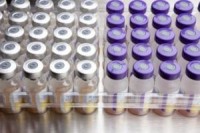 A made-in-Canada experimental Ebola vaccine will be offered for use in the West African outbreak response, the Public Health Agency of Canada revealed Tuesday.
A made-in-Canada experimental Ebola vaccine will be offered for use in the West African outbreak response, the Public Health Agency of Canada revealed Tuesday.
The news comes hours after the World Health Organization said a panel of experts advised that it would be ethical to use untested drugs and vaccines in this raging epidemic, which is several times larger than any previous outbreak.
"We see this as a global resource and we need to have some conversations to figure out what the best use of this experimental vaccine is," said Dr. Gregory Taylor, deputy head of the public health agency.
He said the agency would be discussing options with international partners and the WHO over the coming days to try to come up with a plan for the best use of what is a limited number of vaccine doses.
In a statement Tuesday, Health Minister Rona Ambrose confirmed that she spoke on the phone with WHO director general Margaret Chan about the donation.
"I was pleased to offer the experimental vaccine developed by Canadian researchers as a global resource to help fight this outbreak," she said, adding that between 800 and 1,000 doses would be donated to the WHO.
Ambrose added that "Canada feels this experimental vaccine is a global resource, so in response we are sharing it with the international community, while keeping a small supply in Canada.
A ministry statement acknowledged that while the vaccine, known as VSV-EBOV, has never been tested in humans, it "has shown promise in animal trials."
The scale and urgency of the global Ebola crisis has prompted a WHO panel to agree that it was ethical to offer such "untested or unproven medical interventions," the ministry said.
Along with the experimental vaccines, Canada will also be contributing an additional $185,000 to the WHO to support infection prevention and control in West Africa.
It's not known how much vaccine an individual would need to be protected. For the time being, the size of a dose is being extrapolated from the research that has been done on primates.
Taylor said the agency would need to hold back some doses to do toxicology studies on the vaccine and other small studies. As well, Canada would want to have some doses on hand to offer health-care workers if someone with Ebola travelled to Canada and turned up in a hospital here.
10 doses sent to Geneva
Ten doses of the vaccine have already been sent to a Geneva hospital, on the request of the WHO and the relief agency Medecins Sans Frontières (Doctors Without Borders). That vaccine is an emergency supply that could be used if a response worker became infected, he said.
Taylor said recently the public health agency's ethics committee met to look at the issue of the vaccine, and concluded that it made ethical sense to make it available in this kind of circumstance.
"The trouble is of course with this very, very limited number of vaccines, who would you give that to?"
Taylor said the advice the agency has been getting is that it would make most sense to give the vaccine to health-care workers at the front lines of the outbreak. But even then, there is not enough vaccine to protect all who are at risk.
Winnipeg research
Taylor said the agency wants to work through the issue quickly, but acknowledged that figuring out how to best use the vaccine will be a challenge.
He said the agency hopes that the people who get the vaccine can be studied, so that the use will provide some data about whether the vaccine works for people.
The WHO ethics panel met Monday to explore issues around the use of untested drugs and vaccines. The meeting was prompted by the recent use of an experimental therapy — known as ZMapp — on two American aid workers and then a Spanish priest. The priest died Tuesday, but the Americans remain alive. Liberia confirmed Tuesday that it has also been promised a few doses of the product.
LeafBio, the company trying to commercialize ZMapp, said Monday that it has no remaining stock of the product, which is based in part on research done at the National Microbiology Laboratory in Winnipeg. It has been estimated that it would take three to four months for another small batch of the drug to be made.
The West African outbreak involves four countries: Guinea, Sierra Leone, Liberia and Nigeria. Since the outbreak first came to the outside world's attention in early March there have been more than 1,800 cases, and more than 1,000 deaths.


Be the first to comment